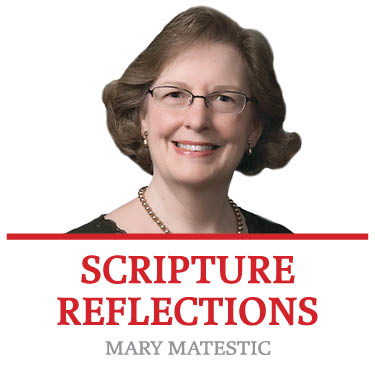June 28, 2020
13th Sunday in Ordinary Time
2 Kings 4:8-11
Romans 6:3-4, 8-11
Matthew 10:37-42
BY MARY MATESTIC
I thought about the graciousness of the woman who invited the prophet Elisha to dine with her whenever he came through her village. Turning the words over and over in my head one night, I asked myself what drew her and her husband to open their home to a complete stranger. Did the agony of her barren womb stretch her beyond herself? Did she see something of God in him and anticipate something of the divine herself? Her hospitality expanded to housing him in a room on their roof whenever he passed by. The narrative swells with goodness.
What I thought about was that somewhere between our acts of kindness and time, there is a bridge built between this world and the Kingdom of God, that our choice to welcome the stranger, whether within or without, will always come with a gift.
In Washington, D.C., during the outcries for justice in the wake of George Floyd’s death, there was a moment when the crowds were herded down a narrow, one-way street while tear gas was being thrown. One man in the neighborhood witnessed the agony and the entrapment of those gathered and he opened up his home. Seventy people crowded into his small living room. He helped them put milk on their eyes to stop the stinging and let them stay through the night until the curfew ended. Such an act of hospitality was notable. When the newscaster found the man, he asked him: “How could you let total strangers into your home?” The gentleman answered: “How could I not? And besides,” he added, “they are no longer strangers.”
Henri Nouwen writes in his book, “Reaching Out,” that an important movement in the spiritual life is the movement from hostility to hospitality. All of us yearn for a place where life can be lived without fear and where we can find security in community. Especially in the Sacred Scriptures, hospitality is upheld as one of the richest biblical concepts encouraged in all the realms of Hebrew society. For hospitality deepens our relationships. The stories of hospitality are many. When Abraham received three strangers at Mamre and gave them food, they revealed to him that next year when they came back, Abraham and Sarah would have a son. (Genesis 18:1-15) During a great famine, Elijah asked for food from the widow at Zeraphath. All she had in her cupboard was a little oil and some flour. She shared her bread with Elijah and in return, he raised her son from death. (1 Kings 1:9-24) In the New Testament, Luke’s account of the story on the Road to Emmaus is filled with images of hospitality and revelation. (Luke 14: 13-25) Out of the sadness of Cleopas and his wife, came Eucharist and the ecstasy of knowing Jesus had risen.
Nouwen points out that these biblical stories help us to realize that in the context of hospitality, both guest and host can reveal their most precious gifts and bring new life to each other.
The Matthean section (chapters 8 through 11:1) is called “The Ministry and Mission in Galilee.” Jesus not only speaks about the mission of the 12, but he commissions them to go from town to town preaching and healing. He tells them what to bring along and what not to bring along. He tells them to rely upon the hospitality of folks who will house and feed them. He warns them of persecutions that will come. He troubles them with the reality that the Good News to some will cause strife and division to others. Finally, Jesus tells his followers this: “Whoever receives you, receives me, and whoever receives me receives the one who sent me.” Six times Jesus repeats the word receive. That anyone who is open to his followers embraces Jesus, himself. And who embraces Jesus embraces the Father. Even the person who gives a cup of cold water to one of Jesus’ followers will have a reward in the end.
That is the bridge I have been thinking about. Whatever acts of kindness, acts of love and openness to hospitality that we practice become bridges connecting this world and the world that is to come. When we sow goodness, we reap goodness; maybe not always in this life, but certainly in the next.
And where does such grace toward kindness come from? Paul is quick to tell us it comes to those who are baptized into Christ Jesus and who have passed through the waters of life. Like the Israelites who came through the Red Sea and no longer had to be slaves to pharaohic leaders who called themselves “gods,” we have died with Christ and now live with him. We are slaves now to God, which in the end is liberating. You and I can face the unknown, knowing.
The summer months will not be without challenge, as have the past three months. We will continue to face closures and cancelations; we hopefully will open up to new conversations about the strife of cultural racism. We will continue to have to face the stranger inside of us and outside of us. But like the barren woman who opened her home to a stranger, our bridges will be constructed from the risk of kindness and hospitality.
